If you’re new to plant-based milk, you may grab a carton of plant-based milk at the local supermarket, believing that the purchase gives you access to a healthy alternative to dairy.
While plant-based milk can indeed offer health benefits over cow milk and other non-dairy beverages, it's still important to pay attention to the ingredient list on the back of the container.
Dipotassium phosphate is one of many food additives put into some store-bought vegan milk.
Although generally regarded as safe, you may want to reconsider buying almond or oat milk that contains this ingredient.
What is Dipotassium Phosphate?
Dipotassium phosphate is an inorganic compound belonging to the phosphate family. It can be mined naturally from phosphate rock or collected from urine or bones.
However, most food-based applications use commercially produced dipotassium phosphate created through partially neutralizing two parts potassium chloride (a type of salt) with phosphoric acid.
Dipotassium phosphate typically has a white or colorless appearance and is easily dissolved in water or other liquids.
The compound has many uses, including as a buffering agent in antifreeze, fertilizer, and food additive.
Dipotassium phosphate is often used as a stabilizer, emulsifier, and texturizer in foods.
For instance, it’s often found in beverages like milk and juice, dry powder beverages, and imitation dairy creamers.
Food manufacturers also use it to help a product maintain its pH levels and as a chelating agent for added calcium (meaning it binds to the compound and keeps it from causing flavor loss or discoloration).
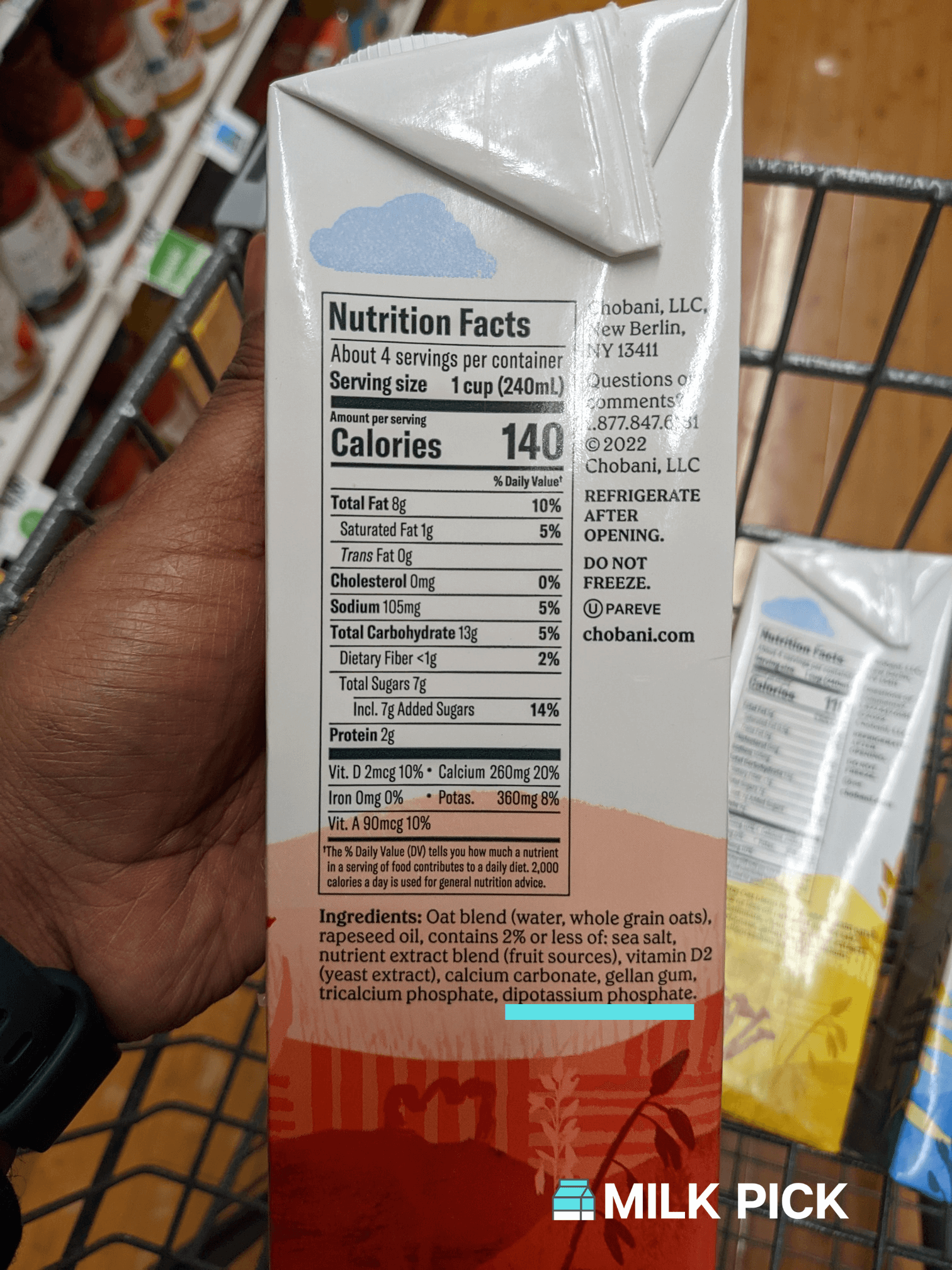
Chobani extra creamy oat milk ingredients / Milk Pick
Why Is Dipotassium Phosphate Used In Plant-Based Milk?
As mentioned above, dipotassium phosphate works as a texturizer, stabilizer, and emulsifier in many juices and beverages.
Emulsifiers work to hold particles together, preventing separation.
Texturizers add buoyancy and a smooth creaminess to liquids, and stabilizers keep products from destabilizing and discoloring over time or in temperature changes.
Plant-based milk and other alternative milk manufacturers use dipotassium phosphate for several reasons, including:
- Keeps the product from separating
- Suspends additives like Vitamins, minerals, and other ingredients from settling
- Creates a creamy, smooth texture that isn’t normally present in almond and oat milk
- Binds added calcium to prevent discoloration
- Helps the product maintain its pH
Perhaps the most significant benefit of adding dipotassium phosphate to these plant-based milk products is that it helps them behave like regular dairy milk.
This factor is especially important for barista blends that are expected to work in hot drinks like cappuccinos, lattes, and tea.
Dipotassium phosphate helps these blends steam, foam, and stretch in hot beverages, allowing those who prefer almond or oat milk to use the product without it curdling, separating, or staying flat.
Dairy milk contains proteins, specifically casein, and other fats and sugars that stabilize it when heated.
Plant-based milk lacks these ingredients, so some brands add dipotassium phosphate to replace these elements.
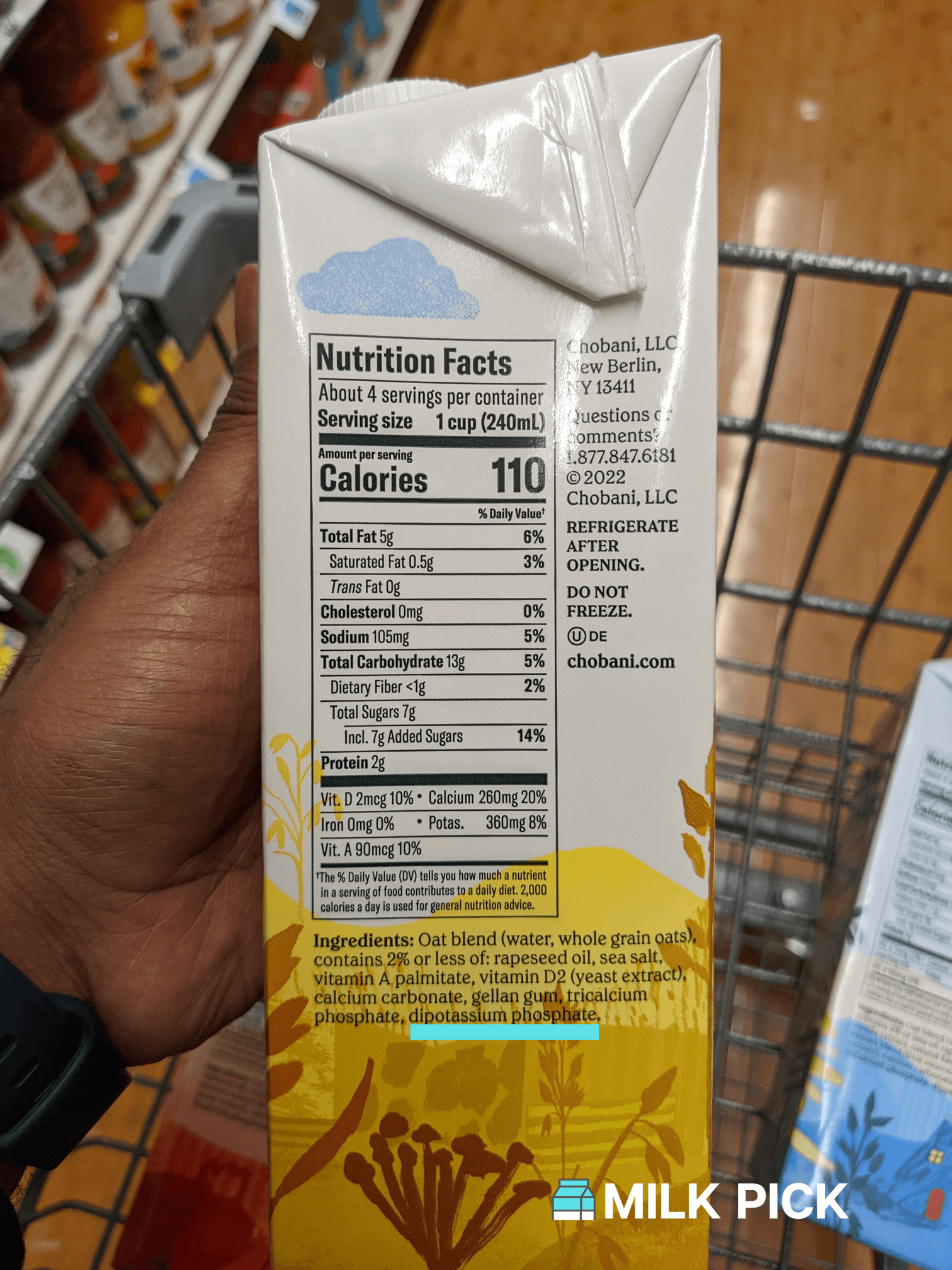
Chobani original oat milk ingredients / Milk Pick
Is Dipotassium Phosphate Safe?
Like many food additives, dipotassium phosphate is classified as Generally Recognized As Safe (GRAS) by the USDA and FDA.
This classification only covers uses as a food ingredient for certain purposes, such as pasteurized cheeses, heavy cream, and evaporated milk.
The ingredient is also approved for use in “incidental” food use for adhesives used for transporting, packaging, and holding food per FDA code 21 CFR 175.105.
The additive is not allowed in products carrying the USDA Organic label.
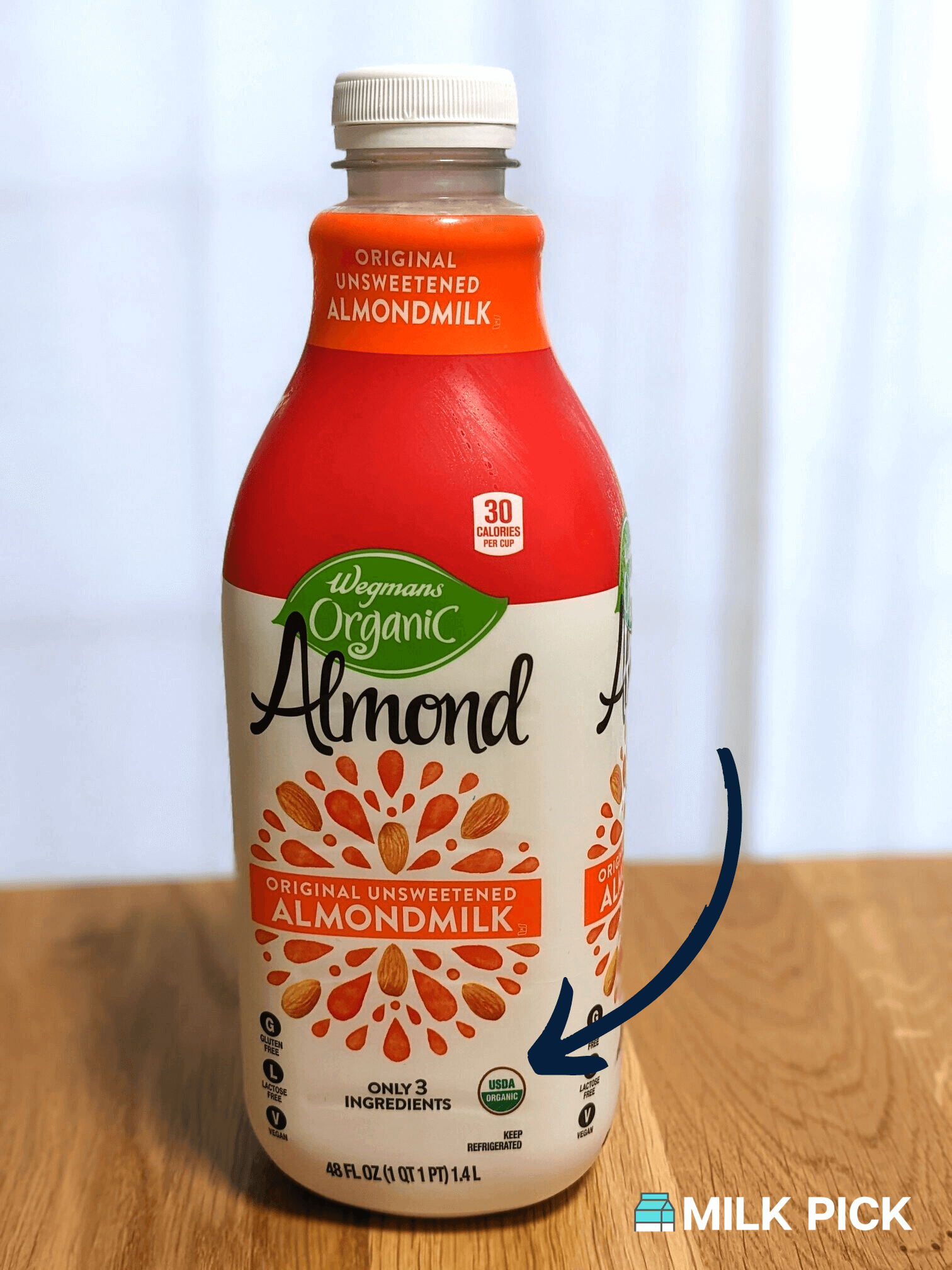
Wegmans organic almond milk / Milk Pick
Despite its GRAS classifications, there are concerns about the safety of dipotassium phosphate.
The most significant troubling facts about dipotassium phosphate include the following:
Man-Made Additive
Dipotassium phosphate is a manufactured substance. Generally, processed, man-made food items are less beneficial to health than those found naturally in nature.
The dipotassium phosphate you might find in your almond or oat milk is synthetically created, which means it’s also less environmentally friendly because it requires fuel, labor, and other factors to create.
Complications With Some Health Conditions
In some people, dipotassium phosphate can cause a buildup of the substance, leading to serious problems.
Normal kidneys work to remove excess phosphorus from the body, but those with kidney disease or other kidney-related conditions may experience hyperphosphatemia.
Hyperphosphatemia can lead to dangerously low calcium levels, resulting in:
- Oral numbness
- Muscle spasms or cramps
- Joint pain
- Itchiness or rash
- Fatigue
- Nausea
- Shortness of breath
- Sleep problems
Phosphates have also been linked to adverse impacts on bone health, calcium deposits, and a higher risk of heart disease.
Indicates Other Additives
Plant-based milk manufacturers add dipotassium phosphate to their products to make it last longer and perform better for consumers.
It inherently changes the milk's look, texture, and feel and indicates that the product isn’t 100% natural or organic.
While this doesn’t necessarily make it dangerous, it does mean that any vegan milk product containing dipotassium phosphate likely has other ingredients.
These other additives might include:
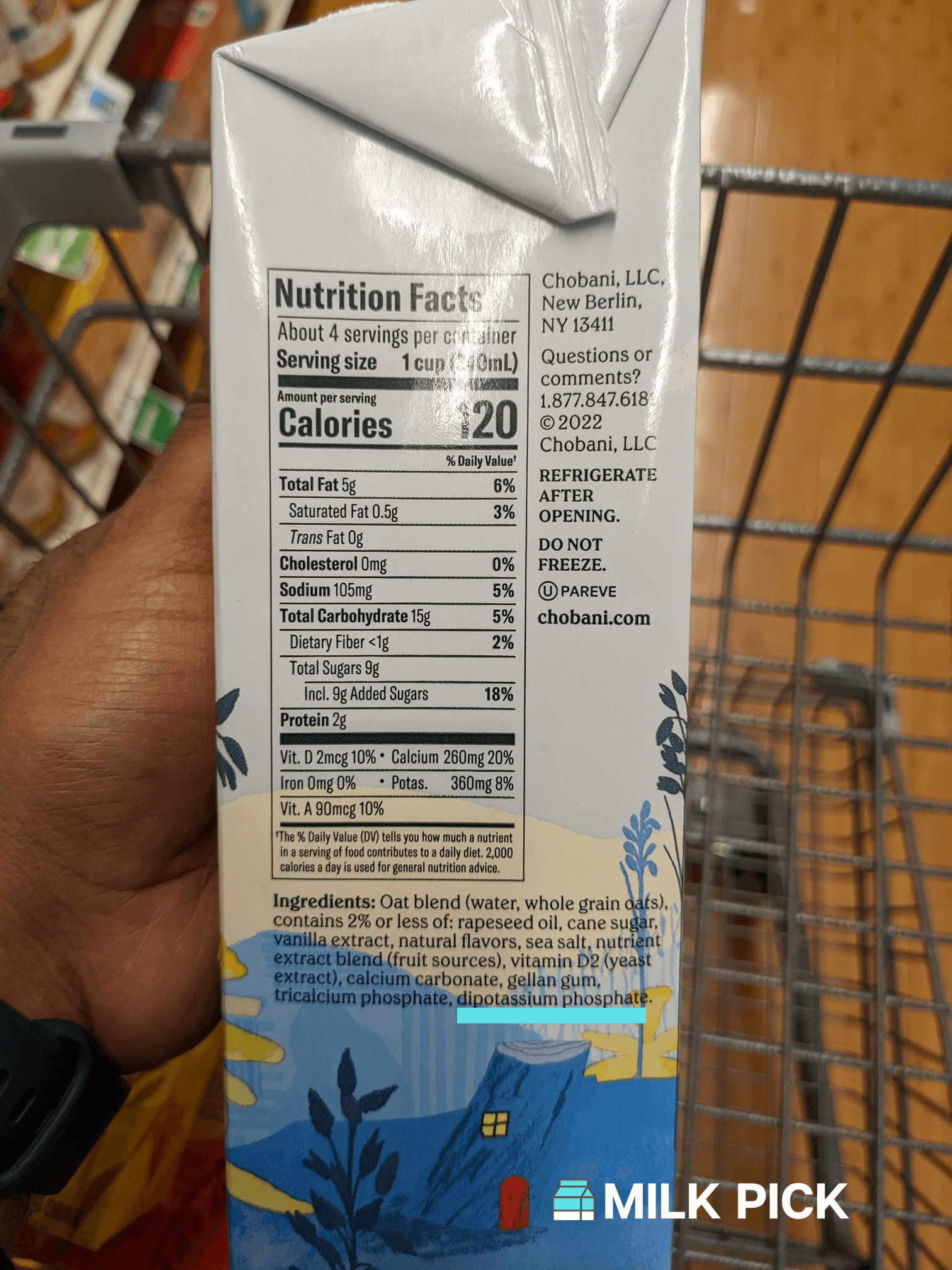
Chobani vanilla oat milk ingredients / Milk Pick
Each of these additives alters the natural state of fresh almond or oat milk.
They also have their own set of potentially adverse effects on health, such as nausea, bloating, inflammation, and others.
Are There Any Benefits To Dipotassium Phosphate?
The only benefits of dipotassium phosphate are those related to its structural and preservative purposes.
Dipotassium phosphate offers no health benefits for the majority of individuals.
Although it could potentially aid someone with severely low phosphorus levels in their diet, most people don’t fall into this category.
96% of Americans get enough phosphorus in their diet, and even supplements only contain about 15% of the RDA to ensure people don’t take too much of the element.
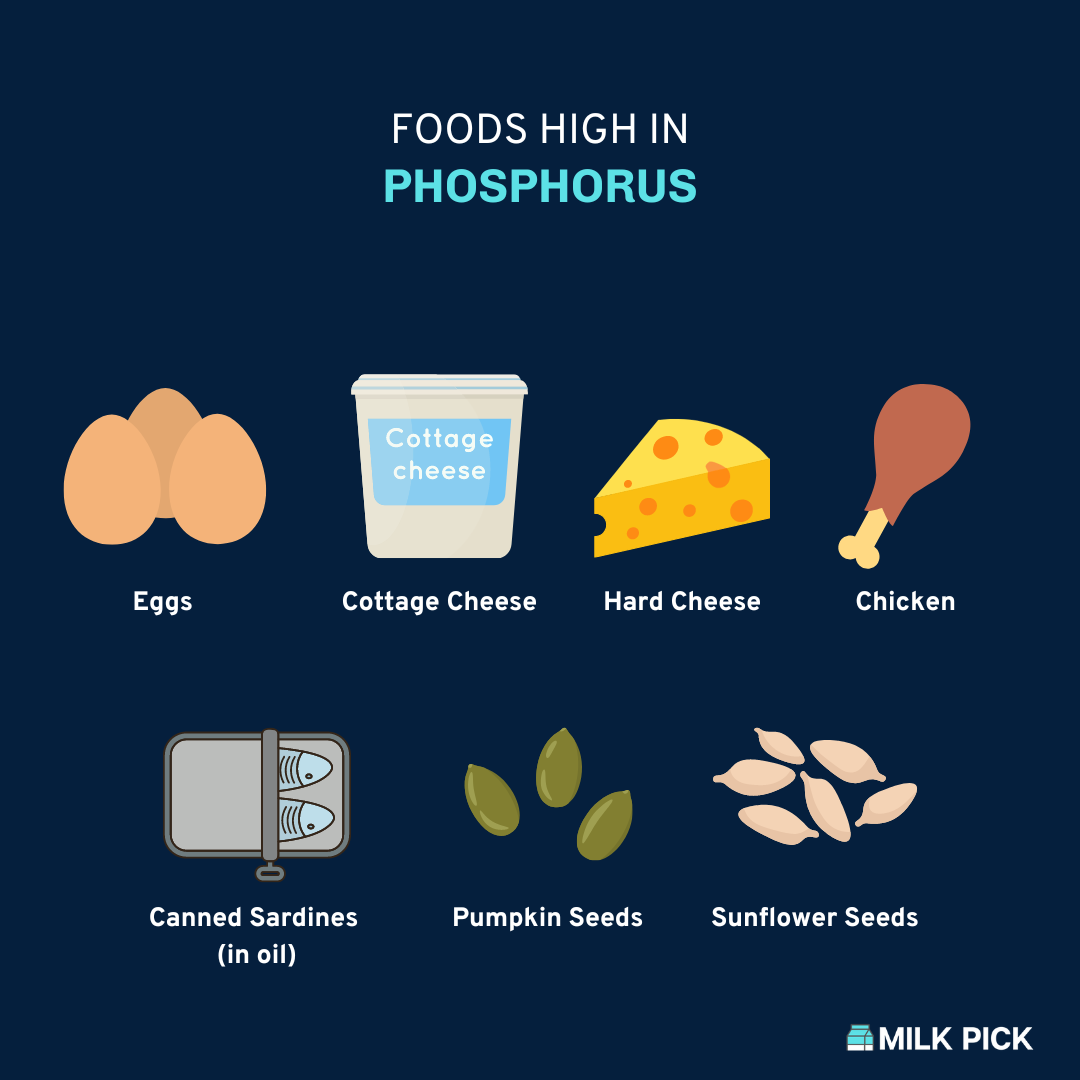
The upper limit RDA for phosphorus is 4,000mg for adults and children 9 to 18 and 460 mg for children 4 to 8.
For reference, Elmhurst 1925’s Barista Blend Almond Milk contains dipotassium phosphate to help it blend with hot beverages.
One serving of this almond milk contains 10%, 584 mg of the RDA of phosphorus.
If you eat other food with phosphorus throughout the day, you may consume too much.
If your body has issues with processing phosphorus, this amount may cause significant health issues.
A study done on mice in 2019 also indicated that a high-phosphate diet may affect exercise intolerance, especially in western countries where phosphate intake is highest.
The study showed that mice fed a diet high in phosphates had reduced fat oxidation, oxygen uptake, fatty acid synthesis, and treadmill duration - meaning their bodies worked against them and made it more difficult to exercise and burn fat.
When Should You Avoid Dipotassium Phosphate?
Although the FDA says dipotassium phosphate is GRAS, there may be certain people or circumstances for which it’s better to avoid or limit the ingredient:
- You are eliminating foods to determine sensitivities
- You are focusing on clean, healthy eating
- You have kidney issues, such as acute or chronic kidney disease
- You have thyroid issues that make it difficult for your body to process phosphates
Even if you don’t fall into one of the above categories, avoiding dipotassium phosphate can still benefit you.
Skipping out on milk with added ingredients can help you boost your health and quit putting synthetic ingredients into your body.
How To Avoid Dipotassium Phosphate In Plant-Based Milk
The only way to avoid dipotassium phosphate is to carefully read the ingredient labels when buying a product.
When choosing almond, oat or other vegan milk, turn the carton to the ingredient label on the back and scan the list.
If you see “dipotassium phosphate” or any other additive that begins with the prefix “pho” it’s likely a variation of the additive.
Organic brands like Wegmans Organic Almondmilk, Three Trees Organic Unsweetened Almond Milk, and New Barn Organics Unsweetened Almond Milk don’t contain dipotassium phosphate.
In fact, all organic brands should be phosphate-free.
You can also make your own plant-based milk with a base (almonds, oats, cashews, etc.) and water.
For instance, here's an example of how to make almond milk.
You can control the ingredients and avoid unnecessary additives when making vegan milk at home.
The Bottom Line on Dipotassium Phosphate
Like many additives, dipotassium phosphate serves a purpose when added to plant-based beverages.
Many people can ingest dipotassium phosphate without ill effects, but that doesn’t mean you shouldn’t try to avoid it.
Those with kidney issues or focused on clean eating will want to steer clear of this additive.
Most people can benefit from reducing the number of additives, especially phosphate-based ingredients, in their diet.
